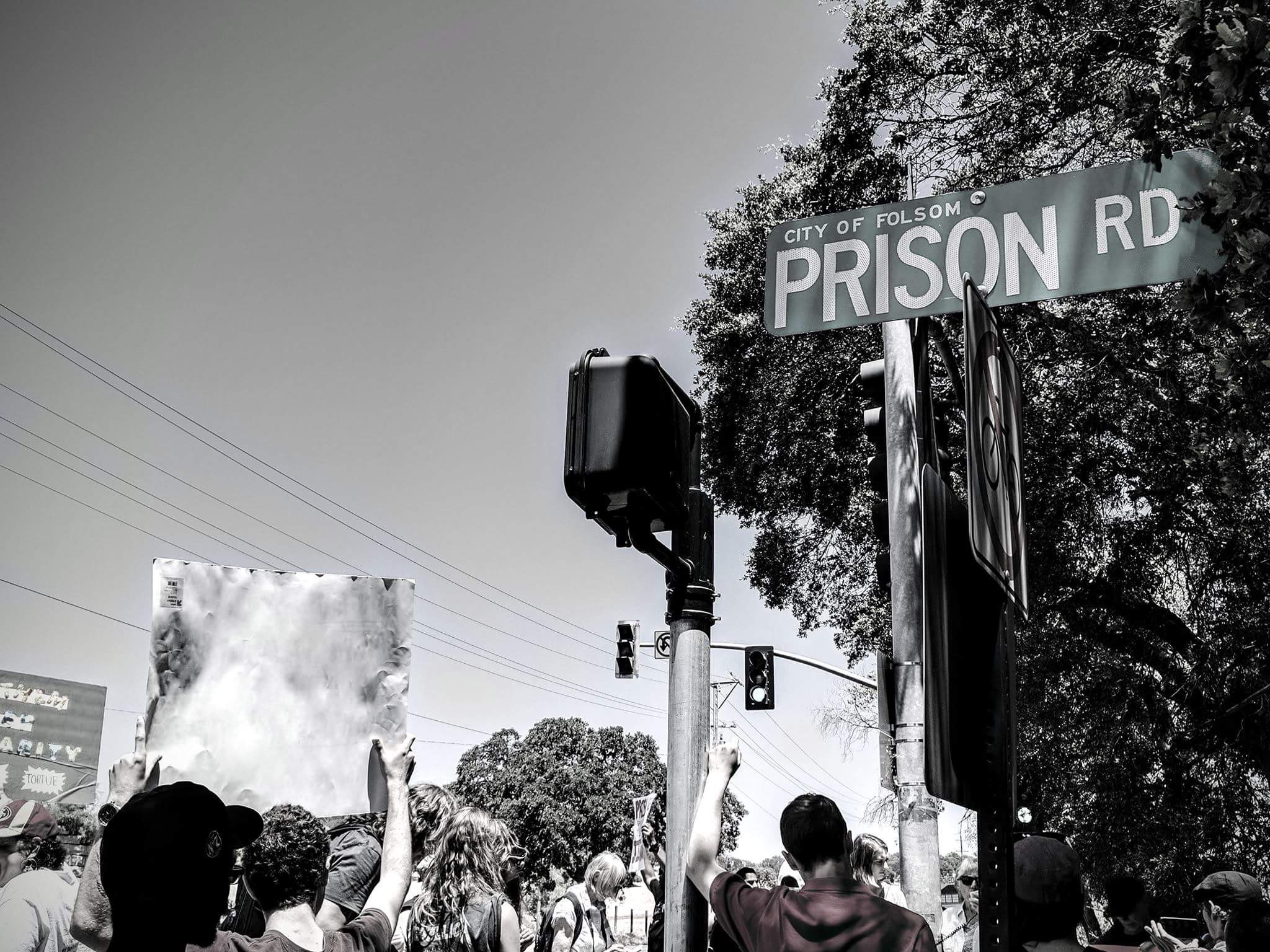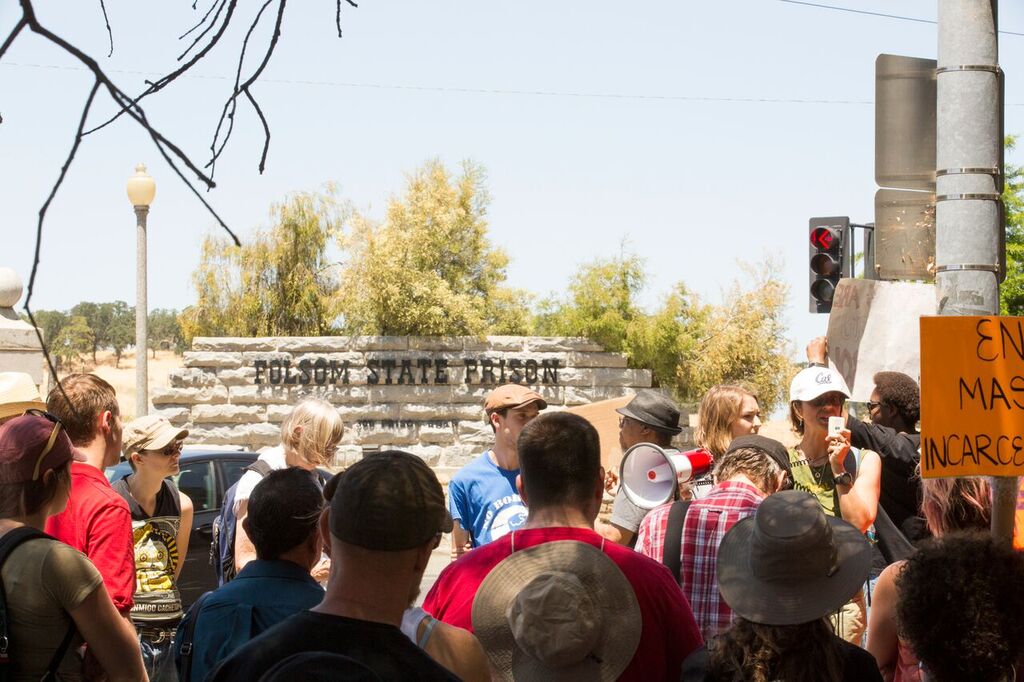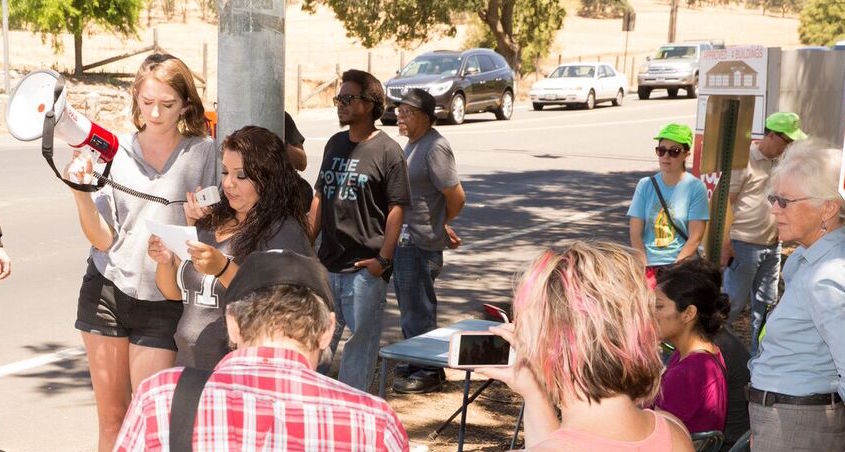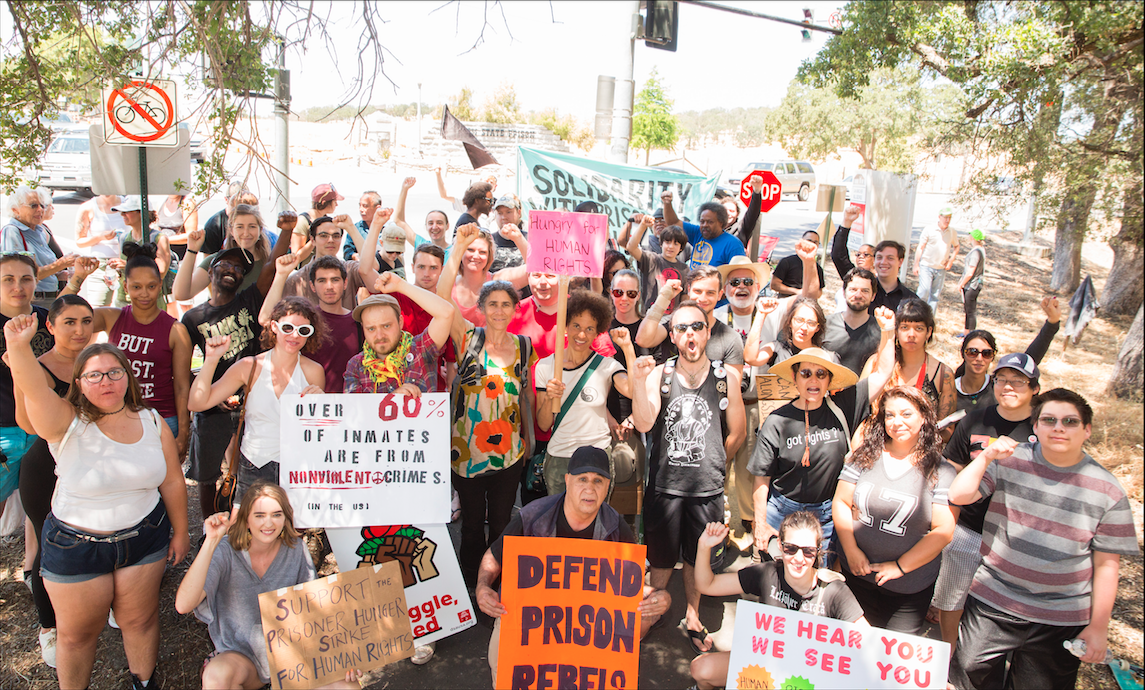Filed under: Action, Development, Incarceration, Southwest

On Sunday the Fourth of June, there was a demo and press briefing outside Old Folsom State Prison to support the recent hunger strike there. Families of prisoners mingled with abolitionists and formerly incarcerated individuals. Many Sacramento locals showed up early with coffee, snacks, signs, a huge banner that read “solidarity with prisoners on hunger strike”, and lots of relevant literature to give out to protesters and visitors alike. More people gradually began to show up as we got closer to noon, the official start time. When promoting, we made sure to let folks know that there were many other ways to support the effort even if they couldn’t make it to the action. We also made sure to emphasize how much this kind of solidarity means to people taking collective action on the inside. After all, hunger strikes only work when those of us on the outside show our support. The prison industrial complex has no conscience, but our collective pressure has the power to hold these systems accountable when strategically applied.

We set up next to a stop light, right before the turn that leads to FSP (Folsom State Prison) and CSP Sacramento. As cars stopped, some of us rushed into the street to hand out leaflets with information on the hunger strike and how to support it. These leaflets included the conditions that led to the strike, the strikers’ demands, contact info for calling in to officials, and a rough script for what to say to them. We were pleasantly surprised by how many people were receptive of our leaflets- a smile goes a long way! Even a truck with a U.S. flag in back rolled down the window to take our material. Many of the people driving past were on their way to visit prisoners, and many expressed how glad they were to see us. Some even parked their cars down the road and came to have a cup of coffee and talk about the hunger strike. The prison staff, who also frequented the intersection, looked less happy to see us.
We reached critical mass shortly after noon, and the crowd gathered around as several speakers took turns on the megaphone. Each one had their own rich stories and deep ties to abolition work- some had supported past hunger strikes, some had loved ones who were currently on hunger strike or currently incarcerated, and some were formerly incarcerated themselves. The history and perspective they brought to the action was invaluable. Their words empowered and inspired those listening, filling us with a sense of determination. We knew we couldn’t turn away from the rebels on the other side of those prison walls, so close and yet so far from us. Before the last speaker took the megaphone, we all chanted with our fists raised: “Folsom it’s your obligation, end long term isolation!”

Statewide Solidarity
In the end, people from all over Northern California came out to express their support for the Folsom hunger strikers. Southern Californians showed up for the effort as well, organizing a solidarity rally of their own at Twin Towers Jail in Los Angeles. It was amazing knowing that as we rallied against Folsom Prison’s cruelty right outside its gates, others were doing the same from all the way in LA. Our fellow abolitionists in SoCal sent us the following thoughts on their experiences that day:
“I saw how exposing the abuse of these prisoners really was making an impact on the people we spoke to. Reminding the people of the importance of holding those that oversee these prisoners accountable and getting the truth out, bringing it to light and encouraging others to take a stand against something huge like this was definitely empowering for me!”
-L., whose husband was just transferred to Folsom, SHU term
“There were over a hundred bicyclists that rode by in groups of 8-15 people at a time. This rally got a lot of exposure including all the people who were passing by heading towards twin towers preparing to visit their loved ones. People asked questions, honked in support, and signed up for the next rally. There was even a family member speaking to her boyfriend who is locked up in twin tower describing the scene outside. So definitely the word got out and we made it happen. We were the voices of Old Folsom prisoners and we made sure our representation stood peaceful and that we explained the reason for our support of Folsom prisoners hunger strike. Of course we did have those who made rude remarks as well as smirks- they mostly came from the cyclists. I believe that we made a great impact and those people who heard us whether they agreed or not and will hear the echo of our voices and talk about this rally throughout the week. Exposure is what was aimed for and I believe we did it. I personally learned of these 9 demands recently and was upset that it is taking human beings to starve to get their demands met. Shame on the Warden. I feel proud to have been alongside two strong women who are passionate about this movement.”
-C., activist and mother
“Organizing the solidarity rally in Los Angeles was the first time I attempted to organize folks all across Southern California. I am used to organizing events locally, not so much statewide. Participating in the efforts of being the voice for Folsom prisoners taught me more in a short time than perhaps the last year or two. It taught me the true meaning of the saying, “Stand up for what you believe in, even if it means standing alone.” I admit I was a little disappointed to see such a small turnout on Sunday. I tend to think big, dream big, and what I saw Sunday vs what I envisioned in my head was the total opposite. I felt hesitant for a few minutes, letting my thoughts get to me, but then L. showed up. I had never met her before the rally, and she busted out signs and pens ready to roll. She said “this is the rally?” And I realized at that moment I had to stand strong and pump her up. She grabbed signs and went to the curb and started shouting! She pushed me to do the same, so I did. It ended up being us 3 ladies and C.’s two kids. I was amazed at the response we got from people. I was worried we wouldn’t get press, but we did. while media coverage is vital to amplifying the prisoners demands, it was almost more important to be able have those one on one conversations, and dialogue with the people. Connect, share, listen, etc. people wanted to know more, asking for contact info. It was beautiful. We even connected with a family who’s loved one was set to transfer to Folsom this week, and while his sentence is short, hearing their fears and concerns only reminded me of why I was standing out there. I feel blessed and honored to have been able to be a part of this movement, and feel immense gratitude towards all of the Sacramento organizers who worked tireless to put everything together. It has inspired me to continue trying to unite folks; the power is really with the people. For the strikers in Folsom, this statement is even more crucial, incarcerated or free, your voice does matter, and it will be heard! There is a lot more work to be done, and we won’t stop until these demands get met. Folsom, we are with you.”
-M., prison solidarity organizer
We’re inspired by the solidarity rally and the dedication and hard work that was put into it. As we learned ourselves in Folsom, making connections and fostering dialogue about these issues is a moving achievement. We are so grateful to have allies all over the state who are ready to spend their time and energy helping us amplify the voices of the hunger strikers at Old Folsom. We plan to continue building solidarity with supporters far and wide!

Keeping Up The Fight
Participating in this action reminded us why we must fight the horrors of the prison industrial complex, and how important it is for us to consistently support prison rebels in our struggle toward social transformation. Families and friends of prisoners don’t need to be told how devastating the system is, or how the world would be a better place if all prisons were burnt out ruins. They have already seen the carnage that mass incarceration leaves in its wake. Prison abolitionists have themselves often been negatively affected by the prison system, whether directly or by association. We need to be learning from and centering these experiences while showing concrete solidarity with those still trapped behind bars. People don’t remember what you say as much as how they make you feel, and our goal was to make sure that prisoners at Folsom and their loved ones felt heard, and felt our support in a tangible way.

The action was an absolute success, but we know that our work is far from over. There is no indication that Old Folsom has conceded to any of the prisoners’ demands, and egregious mistreatment and abuse continues. Recently, we received an extremely concerning update about the treatment of one of the hunger strikers. Prison officials are in fact issuing a disciplinary “115” to Anthony (who was transferred to Tracy) for being a “leader in a mass disturbance.” Not only is this assertion false, as the hunger strike was a collective effort, but this serious repression could mean that Anthony is “revalidated” & considered an active gang member, has visits taken away, and/or has additional time added to his SHU term, meaning they will hold him in solitary confinement longer.
We need supporters to continue contacting officials—urge them to meet the prisoners’ nine human rights demands and to immediately cease their repression against hunger strikers.
Officials to Call:
Chief Deputy Inspector General Roy Wesley (916) 255-1102
Ombudsman Sara L. Smith (916) 324-5458 sara.smith@cdcr.ca.gov
Secretary Scott Kernan scott.kernan@cdcr.ca.gov
Undersecretary Ralph M. Diaz ralph.diaz@cdcr.ca.gov
Governor Jerry Brown (916) 445-2481
Chief Office of Ombudsman Sara Malone sara.malone@cdcr.ca.gov
Public Information Office of Folsom, Jack Huey jack.huey@cdcr.ca.gov (916) 985-2561 (Press #1 for English, #3 for admin, and #1 again)
Folsom Warden Ron Rackley ronald.rackley@cdcr.ca.gov
Old Folsom State Prison (916) 985-2561
(Press #1 for English, #3 for admin, and #1 for the P.I.O.)
SAMPLE SCRIPT:
“Hello, my name is ___________ and I’m a resident of _______ (name your state). I am calling in support of the hunger strike that began in Folsom State Prison ASU on May 25th. I am deeply concerned about the inhumane, cruel, and unusual conditions of confinement there. I urge you to meet the Hunger Strikers’ reasonable human rights demands and to not retaliate against them.”
Rallying publicly in support of the hunger strikers is a huge step, but it is one of many in the long and grueling process of demanding accountability and creating real change for the benefit of exiled populations. The fight against Folsom State Prison is part of a greater struggle against the prison industrial complex, and we’re in it for the long run despite the enormous power behind what we’re up against. The wellbeing, livelihood, and basic human rights of so many are dependent on those of us on the outside resisting in unity with those on the inside.





